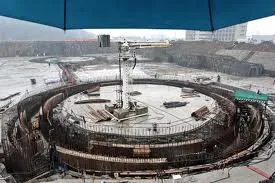
China resumes nuclear power expansion
China is set to resume its nuclear power projects next month.
According to Xu Yuming, deputy secretary-general of the China Nuclear Energy Association, many plans are already reaching the final approval stage.
But the new approvals will move much more slowly than before the Fukushima nuclear crisis.
On March 16 last year, after the accident in Japan, the State Council announced that it would suspend approval
of nuclear plant construction and ordered safety inspections at all plants.
Before the Japanese quake, China had planned to increase its nuclear-generation capacity by about 10 gW
annually to 80 gW by 2020, or by eight reactors each year. In fact, it approved eight to 10 reactors each year
between 2008 and 2010.
China had spent as much as $4.7 billion in upgrading its nuclear industry, including the manufacturing end, but
suspended new nuclear projects after last year's earthquake and tsunami in Japan crippled the Fukushima Daiichi
plant.
Over the past 14 months, no new projects have been approved or started construction.
However, by the end of this year, two new reactors - one in Hongyanhe, Liaoning province and one in Ningde,
Fujian province - will go into operation, Xu said.
China had 11.3 gigawatts of nuclear capacity at the end of 2011, with another 26 reactors, or 29 gW, under construction.
The government passed the National Nuclear Contingency Plan in April, an indication that it is getting closer to resume new project approval.
Xu predicted that China will have 70 gW of installed capacity by 2020, with another 30 gW under construction.
"The delay in new project construction has severely affected China's nuclear industry. Preliminary work on new
sites stalled, while the manufacturing of key components has been delayed as new orders slumped," said Xu.
Constraints on the industry include staff training, which usually takes four to eight years.
"China has about 1,000 nuclear experts now but will need 4,000 by 2020," said Donald Hoffman, president of
Excel Services Corp, a US-based nuclear regulatory and engineering services provider.
For more, click here.








![Cross Domain [Manu + SBR + ABF + ABR + FMCG + HBR + ]](https://cmg-qa.s3.ap-southeast-1.amazonaws.com/s3fs-public/styles/exclusive_featured_article/public/2025-01/earth-3537401_1920_4.jpg.webp?itok=WaRpTJwE)
![Cross Domain [SBR + ABR]](https://cmg-qa.s3.ap-southeast-1.amazonaws.com/s3fs-public/styles/exclusive_featured_article/public/2025-01/pexels-jahoo-867092-2_1.jpg.webp?itok=o7MUL1oO)









 Advertise
Advertise


